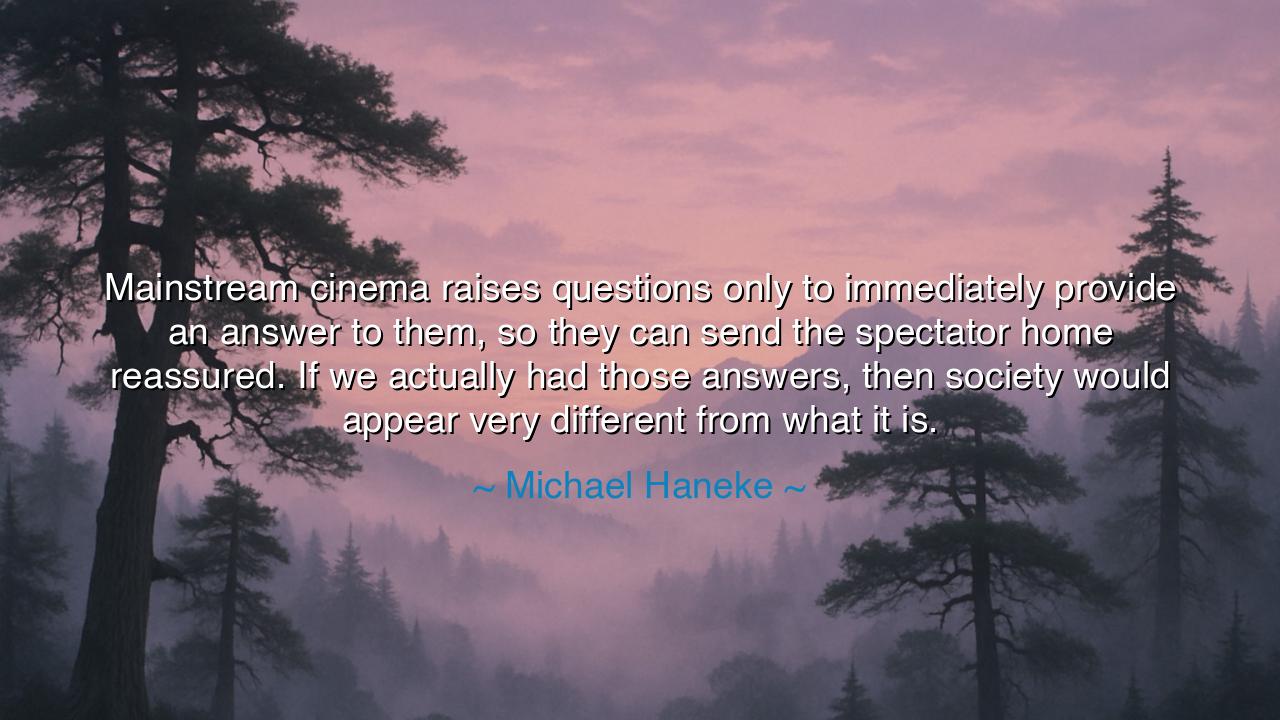
Mainstream cinema raises questions only to immediately provide an
Mainstream cinema raises questions only to immediately provide an answer to them, so they can send the spectator home reassured. If we actually had those answers, then society would appear very different from what it is.






Hear now the hauntingly profound words of Michael Haneke, the philosopher of the screen: “Mainstream cinema raises questions only to immediately provide an answer to them, so they can send the spectator home reassured. If we actually had those answers, then society would appear very different from what it is.” In this saying lies a truth both ancient and unsettling—the truth that comfort, when given too easily, dulls the mind and blinds the heart. Haneke speaks not merely of film, but of the human hunger for illusion—the yearning to believe that every story, every suffering, can be neatly resolved. Yet, as he reminds us, if such answers truly existed, the world would not tremble beneath the weight of injustice, confusion, and longing as it still does.
The origin of this quote arises from Haneke’s rebellion against the false serenity of modern storytelling. His films—stark, unflinching, and discomforting—reject the soft balm of happy endings. He is the mirror held up to civilization’s face, showing the shadows we refuse to confront. To him, cinema is not meant to soothe, but to awaken; not to pacify, but to provoke. His words cry out against the great lie of art that seeks to console rather than challenge—the lie that pretends life’s mysteries can be solved within two hours, that moral dilemmas can be tamed, and that the human heart can be cleanly understood.
In the ages long past, the poets of truth knew this same struggle. When Sophocles wrote Oedipus Rex, he offered no simple comfort to his audience. His tale was not one of triumph, but of tragedy—the story of a man who sought truth only to be destroyed by it. The citizens of Athens did not leave the theater reassured; they left in awe, in terror, in reflection. Such was the purpose of true art in the ancient world—to hold a mirror to the soul and to awaken catharsis through confrontation, not escapism. Haneke’s wisdom is the echo of this forgotten age: that art must not hide our wounds with glitter, but expose them to the healing fire of awareness.
For mainstream cinema, as Haneke laments, often plays the role of the dream merchant. It raises questions only to answer them swiftly, restoring balance, ensuring the viewer feels safe once more. Yet the world beyond the theater door remains the same—unequal, restless, wounded. Why? Because answers given too easily do not change us. True transformation comes not from reassurance, but from unrest. It comes from sitting in the discomfort of the unknown, from daring to question without the promise of resolution. The ancient sages taught that wisdom begins not in certainty, but in doubt.
Consider the philosopher Socrates, who declared that the only thing he knew was that he knew nothing. In this confession lay his power. He refused the easy answers of his time, and by questioning, he illuminated truth for others. But for this, he was condemned to death by those who preferred comfort to truth. Haneke, too, walks in this lineage: the artist who dares to disturb the peace of illusion so that the deeper peace of truth may one day be born. The questions his art raises remain unanswered—not because they cannot be answered, but because they must be lived.
The wisdom of Haneke’s saying reaches beyond cinema. It speaks to the way we live our own lives. How often do we seek certainty where there is none? How often do we turn away from the difficult questions of morality, justice, and meaning because the answers are not simple? The modern world, like mainstream cinema, prefers speed over depth, conclusion over contemplation. But the soul does not grow through comfort—it grows through the struggle to understand.
Therefore, children of the future, take this lesson to heart: beware of the stories that comfort you too quickly. Seek instead those that trouble you, that make you think, that leave you awake long into the night. Do not flee from the unanswered question, for it is the seed of wisdom. Whether in art, in love, or in the great theater of life itself, resist the temptation to wrap your uncertainty in false resolution. For when humanity learns to live not with easy answers, but with honest inquiry, then—and only then—will society begin to change.
Thus let us honor the words of Michael Haneke, who reminds us that art, like truth, must sometimes wound to heal. May we learn to cherish discomfort, to question endlessly, and to walk courageously in the space between knowing and unknowing. For it is there, in the silence after the question, that the soul awakens—and the true story of humanity begins.






AAdministratorAdministrator
Welcome, honored guests. Please leave a comment, we will respond soon